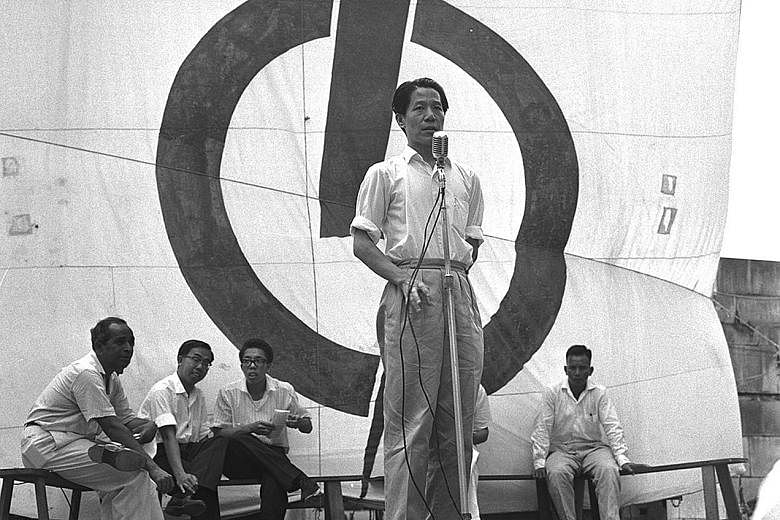When Singapore's founding Prime Minister Lee Kuan Yew spoke in Mandarin for the first time at a political rally in 1955, it was Mr Jek Yeun Thong who wrote the one-page speech.
Mr Jek, then the chief reporter at Chinese broadsheet Sin Pao, had also spent time going through the speech with Mr Lee, coaching him on the pronunciation of the words.
He would later play an important role in helping the People's Action Party (PAP) mobilise the Chinese-speaking ground to support the party's vision of a non-communist, multiracial Singapore.
On Sunday, the former minister, one of the PAP Old Guard leaders, died in his Bukit Timah home. He was 87. Mr Jek leaves behind his wife, Madam Huang Kek Chee, 84, sons Jek Kian Jin, 59, and Jek Kian Yee, 55, and five grandchildren.
Son Kian Yee said his father had been quite frail since his last public event at Singapore's SG50 National Day Parade celebration in 2015.
"Old age was catching up with him and (he had) various illnesses. He passed away peacefully in his sleep, and the family was with him till the end," he told The Straits Times yesterday.
He added that the family, heeding Mr Jek's wishes, held a private wake, and the funeral was on Tuesday.
The younger Mr Jek said his father had wanted a low-profile and quiet departure, like the farewell described in one of his favourite poems, Taking Leave Of Cambridge Again, by Chinese poet Xu Zhimo.
The last stanza describes a quiet, inconspicuous farewell, without "taking away a single cloud".
Said the son: "This encapsulates his philosophy, which he had often spoken to us about... He came quietly and wanted to go quietly."
In a condolence letter to Mrs Jek, Prime Minister Lee Hsien Loong highlighted his contributions and said his death was a "deep loss to the nation".
From his teenage years, Mr Jek had been politically aware. He was a student union leader and editor of a wall newspaper, which is put up on walls, when studying at The Chinese High School.
But in 1950, he was expelled from school for anti-colonial activities. He was blacklisted by the Special Branch, and could not continue his studies in any school in Singapore.
In 1954, he joined the two organisations that got him into politics: Left-leaning Chinese newspaper Sin Pao and the PAP.
Although he had left-wing sympathies and was detained in 1957, he later backed the non-communist camp, and helped the PAP write speeches and pamphlets in Chinese to reach out to the Chinese ground.
Recounting his first Mandarin rally speech in Bandar Street Square, the late Mr Lee Kuan Yew credited Mr Jek with playing a crucial role: "A friendly Sin Pao reporter called Jek Yeun Thong drafted two paragraphs for me, and then spent several hours coaching me to read a speech that took only three minutes to deliver. But the crowd was with me, and they cheered me for the effort."
In 1959, after the legislative assembly election, the PAP came into power and Mr Jek became Mr Lee Kuan Yew's political secretary.
Two years later, he contested and lost in his first election, the Hong Lim by-election. He won in Queenstown in 1963, holding the seat until 1988, when he retired.
Due to his Chinese-speaking background - he was fluent in Mandarin and Cantonese - Mr Jek sat on a 1960 panel tasked to reform the then Nanyang University, or Nantah.
Its degrees were not officially recognised because of doubts about academic standards. It affected the students' employment opportunities and frustrated them.
The issue flared up in the 1963 election, and Mr Jek's involvement in the negotiations helped to fend off accusations that the PAP was against Chinese education, said Lee's Lieutenants, a book on Mr Lee Kuan Yew and the Old Guard.
As Culture Minister from 1968 to 1978, he championed Chinese education, speaking out against the use of hanyu pinyin and the adoption of simplified Chinese characters.
He also stoutly supported a multi-racial society, often speaking of the vital role of Singapore culture in bridging different communities. In 1971, he prescribed it as a cure to guard against "hippism", and "insulate our people against soft living and social pollution".
He pushed through the Newspapers and Printing Presses Act in 1974. He stressed that its sole aim is "to safeguard our national interest and well-being of our citizens by preventing our newspapers from being used as instruments for subversion".
The Act's provisions include issuance of management shares with greater voting rights and the public listing of major newspapers so that they do not come under the control of a single person or family.
As Labour Minister from 1963 to 1968, he was responsible for the 1968 Employment Act, which gives employers more power on staff transfer and retrenchment. It laid the groundwork for better labour relations, paving the way for industrialisation.
He was Minister for Science and Technology from 1976 to 1980, when he left the Cabinet. Eight years later, he retired from politics.
In 1990, Mr Jek, a first-generation leader, received one of the most prestigious national awards: the Order of the Nila Utama (Second Class).



